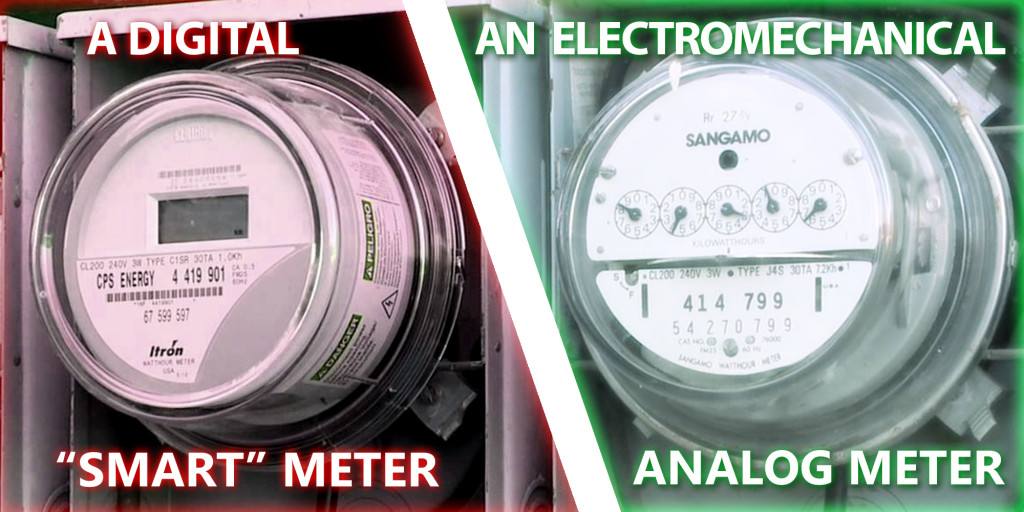 By B.N. Frank
By B.N. Frank
American opposition to expensive, hazardous, and privacy invasive utility “Smart” Meters (electric, gas, and water) has been ongoing since companies first started deploying them. Adding insult to injury, the high costs associated with purchasing, installing, and replacing them tend to be passed on to customers (see 1, 2, 3, 4, 5, 6, 7, 8, 9, 10, 11, 12, 13, 14, 15, 16, 17, 18, 19, 20, 21, 22, 23).
Despite all the problems associated with these meters – including fires, explosions (see 1, 2, 3) and health risks to humans and pets (see 1, 2, 3) – proponents still insist that they’re better than more affordable, reliable, and safer traditional 1-way transmitting analog meters. Keep dreaming!
From Utility Dive:
Dive Brief:
- Nevada, Washington and Idaho are the top three states in utility performance for combined affordability, reliability and environmental responsibility, according to an inaugural report from Citizens Utility Board (CUB). Hawaii, Alaska and West Virginia rank last on those combined measures among all states and the District of Columbia.
- Using federal data, the report — “Electric Utility Performance: A State-by-State Data Review” — aims to chart the progress of utilities through the energy transition, according to CUB, a Chicago-based ratepayer watchdog organization. Among its findings, the rankings indicate a weak connection between investments in advanced metering infrastructure (AMI) and reliability in some states, the group said.
- “You can’t improve what you don’t measure,” David Kolata, CUB executive director, said Friday in an interview. “We want to make this data more accessible. We think it’s important as we start thinking through the energy transition to document how it’s working.”
Dive Insight:
CUB’s report comes as investor-owned utilities are preparing to spend about $140 billion annually in capital expenditures over the next two years, up from about $79 billion in 2011.
Duke Energy, for example, plans to spend more than $130 billion in the next 10 years, with $63 billion in expenditures slated to occur in the next five, Steve Young, Duke executive vice president and chief financial officer, said Feb. 10 during a quarterly earnings call with investor analysts.
More than 80% of Duke’s capital plan through 2026 will fund investments in the company’s “fleet transition” and grid modernization, according to Young. The plan puts Duke on track to expand its rate base by 6.5% to 7% a year, Young said. Duke owns utilities in Florida, Indiana, Ohio, North Carolina and South Carolina.
CUB hopes regulators, policymakers and stakeholders can use the group’s report, which is set to be updated annually, to monitor how utilities perform during the energy transition, according to Kolata.
“We have to move beyond just simply: ‘Okay, here’s how much utilities are spending,’ and we have to move toward ‘What are we actually getting as a consequence of that?’” Kolata said. “What’s happening to our bills, what’s happening to our environmental performance and what’s happening to our reliability? And if what we find is that rate base is going up, but we’re not seeing improvements in reliability or environmental performance, that raises pretty profound questions.”
The report is based on 2019 data from the Energy Information Administration, the Environmental Protection Agency, the Census Bureau and other federal agencies, according to CUB.
Electric Utility Performance Rankings
| Rank | Affordability | Reliability | Environment |
|---|---|---|---|
| 1 | Utah | Nevada/Arizona (tie) | Washington |
| 2 | Washington | — | Oregon |
| 3 | Idaho | Nebraska/Delaware (tie) | South Dakota |
| … | … | … | … |
| 49 | Alaska | Louisiana | West Virginia |
| 50 | Connecticut | Maine | Indiana |
| 51 | Hawaii | West Virginia | Kentucky |
More research is needed to determine what specifically drives the results of the rankings, according to CUB. However, the group said there were some tentative conclusions that could be drawn from the report.
The report found that some states heavily dependent on coal-fired generation, such as West Virginia and Indiana, had below-average affordability metrics, debunking the idea that fossil-fueled generation is generally less expensive than alternate sources of power, according to CUB.
The state rankings indicate the connection between AMI and reliability is not necessarily strong, according to CUB. Some states that have launched AMI upgrades, such as Nevada and Florida, do comparatively well, but states like Michigan, Oklahoma and Ohio that have invested heavily in grid modernization lag in reliability performance, CUB said.
“While likely a necessary condition for future improved resiliency, it appears that smart grid infrastructure, by itself, is not enough to improve reliability,” CUB said.
Also, CUB found that many states with the lowest per unit power costs have some of the highest average residential bills.
The difference is partly caused by weather, but energy efficiency and other cost-effective clean energy resources suppress power bills over time, especially in restructured states, according to CUB.
“Consumers at the end of the day pay bills, not rates, so analysis of any program or policy suite must examine the impact over time on energy bills,” CUB said.
States that tend to be at the top of any one category are often high performers across all categories, CUB said in the report. The same pattern shows up for states at the bottom of any metric. “While it requires further investigation, this suggests an interrelated socio-policy landscape producing consistent results,” CUB said.
In future reports, CUB intends to take a closer look at the factors that lead to utility performance outcomes, according to Kolata.
Opposition to “Smart” Meters is worldwide. A free online documentary provides more information about these horrible devices.
Activist Post reports regularly about “Smart” Meters and other unsafe technology. For more information, visit our archives and the following websites:
- Coalition to Stop Smart Meters
- EMF Safety Network
- StopSmartMeters.org
- Smart Meter Harm
- Smart Grid Awareness
- Smart Meter News
- Smart Meter Education Network
- Take Back Your Power
- The People’s Initiative
- Wireless Information Network
- Electromagnetic Radiation Safety
- Environmental Health Trust
- Physicians for Safe Technology
- Wireless Information Network
Become a Patron!
Or support us at SubscribeStar
Donate cryptocurrency HERE
Subscribe to Activist Post for truth, peace, and freedom news. Follow us on SoMee, Telegram, HIVE, Flote, Minds, MeWe, Twitter, Gab, What Really Happened and GETTR.
Provide, Protect and Profit from what’s coming! Get a free issue of Counter Markets today.



Be the first to comment on "Electric “Smart” Meters “lag in reliability performance” in Some States (Report)"